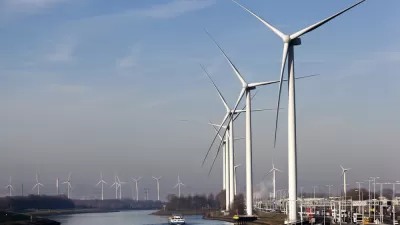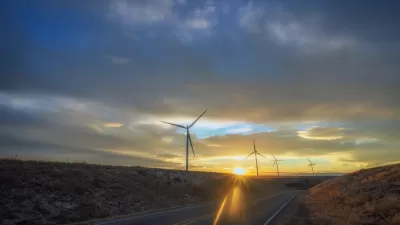Tribal communities claim that a major wind energy project threatens sensitive cultural and environmental resources.

A group of tribal communities in Washington state is suing to stop a massive wind energy project, “alleging that the decision-making process sidestepped state law and failed to mitigate potential damage to the tribe’s treaty-protected natural and cultural resources.”
As Natalia Mesa explains in High Country News, the project, which includes three solar arrays and over 200 wind turbines, extends into Yakama ceremonial sites and historically and culturally important areas. “Development would also impact the natural habitat of pronghorn and ferruginous hawks, a threatened species featured prominently in Yakama Nation ceremonies.”
The proposal has gone through several iterations after the state’s Energy Facility Site Evaluation Council (EFSEC) recommended that the developer downsize the project and take steps to mitigate any potential harms. “Tri-Cities C.A.R.E.S., a group of homeowners, and Benton County also filed lawsuits. The lawsuits are separate but similar, and they cite different concerns: Tri-Cities C.A.R.E.S. sued mainly to protect homeowners’ viewshed and property values, while Benton County contends that the project would significantly disrupt the area’s agricultural industry.”
The controversy highlights a flaw in the state’s permitting system, which doesn’t call for public and tribal consultation until after a project proposal is submitted. “Audubon, tribes and other stakeholders are currently in talks with developers and state officials, pushing for a new approach that requires consultation with tribes and local governments before projects are approved. Instead of having developers submit plans, tribal nations and local governments would establish “build-ready” sites — sites that are pre-vetted for clean energy buildout.”
FULL STORY: Tribes sue after massive wind farm in Washington gets green light

Maui's Vacation Rental Debate Turns Ugly
Verbal attacks, misinformation campaigns and fistfights plague a high-stakes debate to convert thousands of vacation rentals into long-term housing.

Planetizen Federal Action Tracker
A weekly monitor of how Trump’s orders and actions are impacting planners and planning in America.

Chicago’s Ghost Rails
Just beneath the surface of the modern city lie the remnants of its expansive early 20th-century streetcar system.

Bend, Oregon Zoning Reforms Prioritize Small-Scale Housing
The city altered its zoning code to allow multi-family housing and eliminated parking mandates citywide.

Amtrak Cutting Jobs, Funding to High-Speed Rail
The agency plans to cut 10 percent of its workforce and has confirmed it will not fund new high-speed rail projects.

LA Denies Basic Services to Unhoused Residents
The city has repeatedly failed to respond to requests for trash pickup at encampment sites, and eliminated a program that provided mobile showers and toilets.
Urban Design for Planners 1: Software Tools
This six-course series explores essential urban design concepts using open source software and equips planners with the tools they need to participate fully in the urban design process.
Planning for Universal Design
Learn the tools for implementing Universal Design in planning regulations.
planning NEXT
Appalachian Highlands Housing Partners
Mpact (founded as Rail~Volution)
City of Camden Redevelopment Agency
City of Astoria
City of Portland
City of Laramie





























